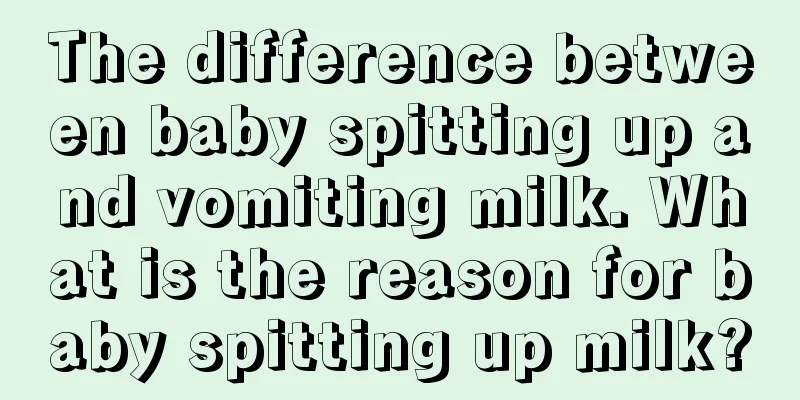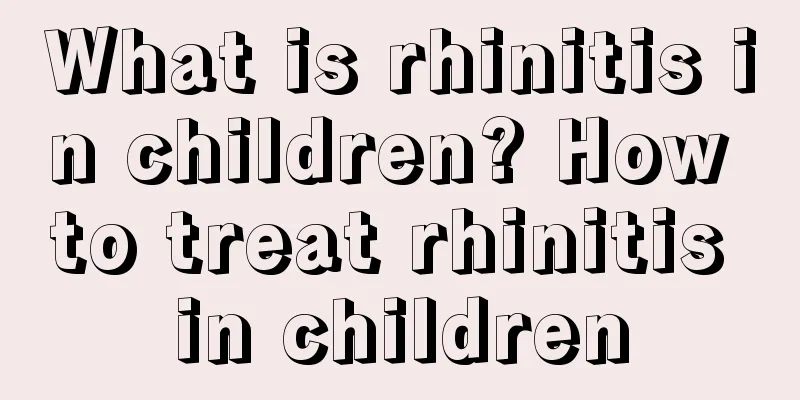The difference between baby spitting up and vomiting milk. What is the reason for baby spitting up milk?

|
It is very normal for babies to spit up milk, but there is also a saying about spitting up milk. However, few people know the difference between the two, especially new mothers. So let's understand the difference between baby spitting up milk and spitting up milk. What is the reason for baby spitting up milk? The difference between spitting up and spitting up milkRegurgitation refers to the passive reflux of gastric contents into the esophagus or out of the mouth. Vomiting is a protective reflex. Through the stimulation of the vomiting center, it reflexively causes the contraction of the pylorus and antrum, relaxation of the fundus and cardia, and strong contraction of the abdominal muscles and diaphragm, which increases abdominal pressure and forces the gastric contents to be discharged from the mouth through the esophagus. Usually, babies do not show much pain after regurgitation, but they often feel more pain after vomiting. During vomiting, the stomach reverses peristalsis, the abdomen and diaphragm contract, and the gastric contents and even intestinal contents are vomited out. At the same time, the glottis and nasopharynx reflexively close breathing and apnea to prevent vomitus from being inhaled or entering the nasal cavity. However, this reflex action is less sensitive for smaller babies, and they are more likely to inhale or even suffocate. Frequent vomiting not only loses water and electrolytes, but also affects the intake of nutrients required for physiology, which can easily cause dehydration and electrolyte disorders. What is the reason for baby spitting up milk?Infant milk spillage is a common physiological phenomenon in infancy. And it mostly occurs in infants of young age. Most of the manifestations are that shortly after feeding, a small amount of milk will overflow from the baby's mouth without much pressure or jetting. The main reason for infant milk spillage is that the stomach capacity of newborn babies is small, and the stomach is horizontal, and the entrance of the stomach, that is, the cardia and pylorus connecting the esophagus and stomach, are not fully developed. In particular, the esophageal muscle tension of infants is also weak, and the cardia relaxation is also prone to occur. These reasons can easily cause milk reflux and milk spillage after the baby feeds. Although infant milk spillage sometimes occurs once or more in a day, it generally does not affect the normal development of the baby. If there is no other discomfort or abnormal reaction, infant milk spillage generally does not need to be treated. It is recommended to pat the baby's back gently after feeding the baby every time, and it is best to have milk burps, which can better reduce the occurrence of milk spillage in the baby. Is the baby spitting up milk because he eats too much?There are many reasons that can cause a baby to spit up milk. For example, due to the child's young age and the physiological structure of the body, the pyloric sphincter of the child's stomach is relatively tense, and the pyloric sphincter of the pylorus is relatively relaxed. In this case, the child may easily spit up milk, even if the child does not eat much milk. Sometimes, children may spit up milk or vomit milk due to surgical diseases such as gastroesophageal reflux, pharyngitis, or intussusception. Therefore, a baby's spitting up milk is sometimes a completely normal physiological phenomenon, and it may also be a sign that the child has eaten too much. Does the baby's spitting up milk mean that he is full?First of all, we need to clarify the cause of milk regurgitation. Milk regurgitation and vomiting are generally caused by multiple reasons. Children under three months old have certain physiological mechanisms, mainly because the sphincter between the stomach and the esophagus is not fully developed, the stomach capacity is relatively small, and it is in a transverse position. As the age increases, such a situation usually occurs due to cold or improper diet. Eating more at a time is also more likely to cause milk regurgitation. Therefore, children still need to pay attention to such a situation and try to reduce it. You can appropriately reduce the amount of milk each time, don't eat too much, and also pay attention to the head-high and foot-low body position. However, sometimes children have milk regurgitation and vomiting, which may also be a case of gastrointestinal dysfunction, not entirely because of being full. Sometimes the amount of food eaten is relatively small, which is also prone to such a situation. It is still necessary to analyze the child's situation in detail, but if milk regurgitation occurs, it is more beneficial to reduce the amount of milk appropriately. |
<<: Can babies use pillows to relieve spitting up? Can baby pillows relieve spitting up?
Recommend
When is the best time to start early childhood education? How to conduct early childhood education efficiently?
When is the best time to start early education? I...
How are Shishuang diapers? Real evaluation of Shishuang diapers
Diapers are an indispensable item for every baby....
How should pregnant women take care of themselves? The second
Many pregnant women do not have very good physica...
Can I wear makeup while breastfeeding? Will wearing makeup during breastfeeding have any effect on my baby?
After finally getting through the period of pregn...
What causes children to be thin? What should children be checked for?
We all know that children are usually thin, but i...
Can pregnant women eat plums? What are the benefits of eating plums in moderation for pregnant women?
Plums are appetizers and aid digestion. They are ...
What should mothers eat when preparing for a second child in the beginning of winter?
The Beginning of Winter solar term represents the...
How to buy clothes for your baby? A guide to buying clothes for your baby
Buying clothes for babies is a headache for many ...
Is it good for babies to change milk powder frequently? What effects will frequent changes of milk powder have on babies?
When some new mothers feed their babies milk powd...
How to judge the condition of female qi and blood, what are the signs
Qi and blood are very important life conditions f...
Do you need to drain the residual milk after weaning? Don’t be fooled by the confinement center again.
Recently, many places like confinement centers ha...
Can women with asthma still get pregnant and have children?
Some women who suffer from asthma want to get pre...
Does premature rupture of membranes mean continuous discharge of fluid? Clinical manifestations of premature rupture of membranes
Pregnant mothers should pay special attention to ...
How to use Zhenshiming Little Yellow Duck Eyewash Solution? How often should Zhenshiming Little Yellow Duck Eyewash Solution be used?
Seeing that many people have bought Zhenshiming L...
Can children with coughs be vaccinated? Can children with coughs be given milk?
Children are prone to getting sick easily because...









